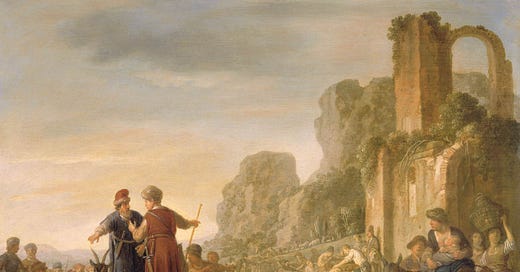Abraham, Value, and the Ethics of Making Money (Part 1)
A Lesson In Biblical Economics And Decision-Making
The story of Abraham and his nephew, Lot, is a profound and vivid examination of the unique faith-fueled economic decision-making that marks the people of God throughout the Biblical and post-Biblical historical witnesses.
Genesis 13 describes how Abraham and Lot lived and worked together for years. As their families and businesses grew, they reached a point where they needed more grazing area for their combined flocks and herds. This led to arguments between the under-shepherds working for Abraham and Lot, and to resolve the issue, they agreed to go their separate ways.
In a remarkable demonstration of love, generosity, and good faith amidst the conflict between their two growing empires, Abraham gave his nephew the choice of where he wanted to settle. Lot elected the fertile land of the Jordan River valley close to the city of Sodom, leaving Abraham, his extended family, herdsmen, and his flocks to settle in the poorer grazing land of Canaan. Despite having less fertile land, Canaan was the land God promised to give to Abraham and his descendants.
Choosing to settle in Canaan instead of closer to Sodom was as much an act of faith and contentment as some of the more dramatic expressions of faith throughout Abraham's life.
That might not sound obvious at first glance. Why should Abraham be commended for offering Lot the choice of where to go if God had promised to give him the land in Canaan? Shouldn't he just have chosen that right off the bat?
Work out the game theory here.
There were two options:
Settle near Canaan, and get worse grazing land.
Choose the better grazing land, even if it meant settling near and exposing himself to the danger of living near Sodom, which is described right in the middle of the story of Abraham and Lot in this way:
"Now the men of Sodom were wicked, great sinners against the Lord." - Genesis 13:13, ESV
If he chose Option 1 and settled in Canaan, it would mean that he was forcing Lot to settle closer to Sodom and exposing him to that risk inherent in settling near its violent inhabitants. If Abraham had chosen Option 2, he would have been putting himself near Sodom and choosing to leave the land God promised him.
So what did he do? Abraham allows Lot to choose where he wants to settle, and submits himself to the consequences. If Lot settled in Canaan, Abraham was willing to assume the risk of living next to Sodom. If Lot decided to live near Sodom, and something were to happen to him, the blood wouldn't be on Abraham’s conscience. He could honestly say that he had diligently sought Lot’s good insofar as it depended on him. In New Testament terms, Abraham "looked not only to his own interest, but also the interests" of his nephew, Lot. Abraham was willing to lay down both his life and (possibly) the inheritance of the land God would give him to protect his nephew from wicked men.
It was an astounding example of unselfishness and faith on Abraham's part. It would have been easy for him to justify taking the better land for himself, even if it meant being closer to a people known for their unique barbarity. Abraham was a nomadic shepherd, and not taking the better land could have proved to be a disastrous financial decision.
And God knew it.
In the following verses, after seeing Abraham turn down the better land around Sodom, God tells Abraham that his faithful response would not be in vain.
The Lord said to Abram, after Lot had separated from him, "Lift up your eyes and look from the place where you are, northward and southward and eastward and westward, for all the land that you see I will give to you and to your offspring forever. I will make your offspring as the dust of the earth, so that if one can count the dust of the earth, your offspring also can be counted. Arise, walk through the length and the breadth of the land, for I will give it to you." So Abram moved his tent and came and settled by the oaks of Mamre, which are at Hebron, and there he built an altar to the Lord. - Genesis 13:14-18, ESV
Abraham's decision-making process regarding where to settle revealed what he valued. It showed what he wanted more than anything and what he was willing to give up to get it. In philosophical terms, Abraham's choices put his axiological principles on display for the entire cosmos (both heavenly and earthly) to see. His actions revealed to God and man that his foundational value commitments were not toward short-term self-preservation but rather the eternal glory of God and the good of mankind, especially those of his own household.
In part two, we'll explore how Abraham's faith-fueled axiology played out when Lot was taken as a prisoner of war as a direct result of his decision to settle near Sodom.




